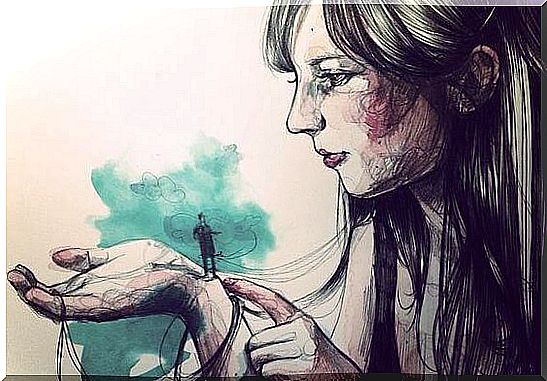5 Ways To Stop Expecting Too Much From Others
Expecting too much from people can cause us discomfort and make it difficult for us to enjoy social relationships. Find out how you can better adjust your expectations.

Who determines what “waiting too long” is ? Simply you.
Sometimes we generate expectations about how things should happen or how the people around us should behave. If these expectations do not adjust to reality, we can feel betrayed or disappointed by “waiting too long.”
Learn 5 tricks that will help you better manage those negative feelings.
We live in a changing and varied world where situations happen quickly as well as personal relationships. As animals we have evolved to survive, often by anticipating changes in our environment.
This trend can be useful to us, but it can also become a problem when the predictions we make do not turn out as we expect. The frustration of not predicting changes can shift our attention focus and place it in the future.
Some psychological theories postulate that anxiety largely appears when the person lives focused on what he expects in the future, often negative expectations, and forgets to enjoy the present. The expectations are varied, from a job, an academic result or a detail of our partner.
Waiting too long, a double edge
As we have said, we are born predisposed to learning and survival. We easily generate predictions based on our life experiences and store them whether they are positive or negative so that we can use them when the time comes.
These patterns are automated and become the cognitive schemes from which, as if it were a filter, we observe and perceive what surrounds us. Their usefulness is undoubted and they can support facets of our personality and our learning.
The problem appears when these schemes become barriers that limit our perception and prevent us from changing behavioral, emotional or cognitive strategies. We move toward the pole of rigidity and lose some of our ability to adapt.
When this happens, we absorb the impact of what is happening around us worse and we become vulnerable to stress and anxiety that causes things to escape our control. In personal relationships, we can start to expect too much, become disappointed, and feel frustrated.
Let’s look at these 5 tips to stop waiting too long and adjust our expectations.
The solution is you
Since it is really not our responsibility what others do or how they behave, let us focus our attention on what we can do ourselves.
1. Get to know yourself
As they say, the first step is to recognize the problems. Many times the cognitive schemas we have talked about are based on closed circles of thought where there is a trigger that may not be fully conscious for us.
This study conducted by the National Autonomous University of Mexico emphasizes how difficult it can sometimes be to be alone with ourselves.
It is important that we are able to identify what kinds of thoughts underlie our reactions to people and the emotions that are activated in us when we begin to expect too much from others.
Choose the last time you were disappointed with someone important to you, ask yourself the following:
- What did I think at the time?
- How I felt?
- What did I do?
- How did I deal with it?
You can choose several situations and look for what things you find that they have in common. Are there any repeating thoughts? Does the way you cope with situations match?
2. Prevent before cure
Once we know better what causes the chains of negative thoughts that lead us to depend on ourselves for expecting too much from people, it is easier to act.
There are different ways to act to stop automated negative thoughts :
- Question that thought or belief. Ask yourself what evidence you have that what you think is true and what signs deny it. This is useful for irrational thoughts that may appear in our minds, such as “Everyone disappoints me” or “No one values me.”
- Stop thinking. The human brain is amazing, but multitasking is often not its strong suit. Try moving the focus of your attention away from that thought that causes you discomfort. Some people choose to do random number additions, spell words.

3. Come back to the present
Currently there is a lot of information about the practice of mindfulness, which can help us better cope with situations that cause anxiety. You can start by practicing the following:
- Take a deep breath. Breathing control can offer us a communication space between the present body and the mind that wanders, according to this study carried out by the University School of Nursing of the University of the Basque Country. This anchoring can serve to stop the flow of thought, especially if you are concentrating on bodily sensations or just feeling the rhythm of your breathing.
- Choose an image. Mentally focusing on an image that we find pleasant, a memory, or a positive word can be a simple but effective resource.
4. Practice self-care
As we have said, sometimes we can perceive what is happening in our environment based on how we feel. This can benefit us, enhancing present positive emotions, or generate discomfort.
Boost your positive emotions through self-care:
- Physical : healthy habits such as physical exercise can help us feel better as well as free us from stress.
- Emotional : offer yourself positive messages, accept your limitations and celebrate your strengths.
5. Seek help
Sometimes problems come and we don’t feel ready to face them. If that is your situation and the expectations you generate have ended up interfering in your social relationships, it is essential that you know that you can seek help.

There are countless psychology professionals who can help you find the solution to your problems.
Main image courtesy of © wikiHow.com
Rachel Lemos Rodriguez
Graduated in Galician and Spanish Studies from the University of Vigo (2013). Master in Applied Linguistics, Languages and Technologies (University of Vigo, 2015). Expert title in Google Marketing Tools and Social Media Marketing (Universidad Rey Juan Carlos, 2017) .Raquel Lemos Rodríguez is a writer, proofreader and has been the editor in charge of the translation team at Editorial Voz y Alma. Currently, she collaborates with different companies as a writer and with some publishers as a proofreader. In addition, he does sporadic work related to social media management. She is a professor of letters at Avanza Formación. He is studying the Degree in Psychology at UNED.









